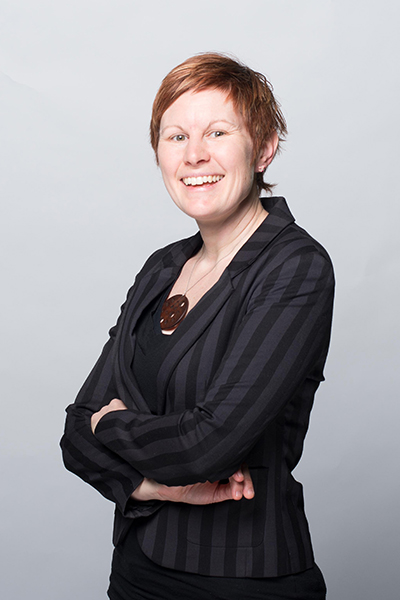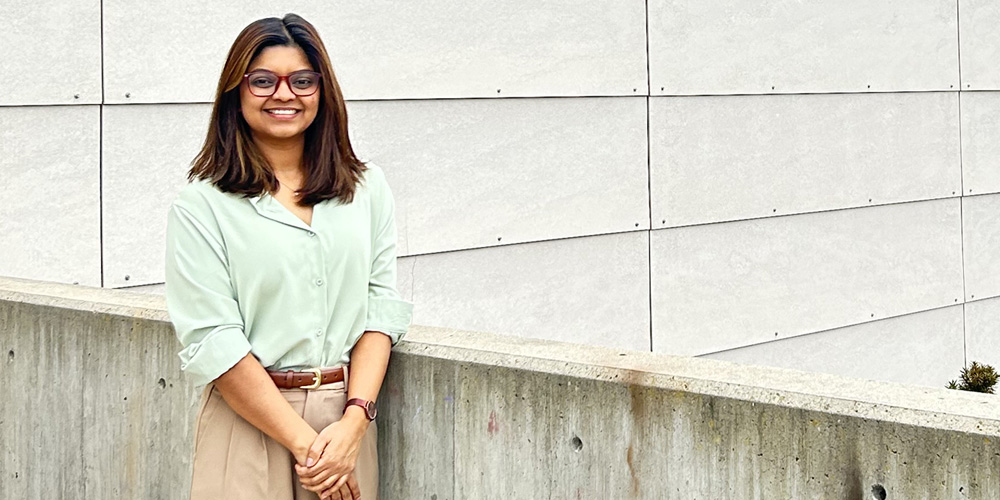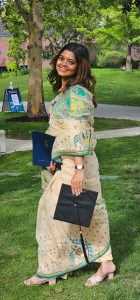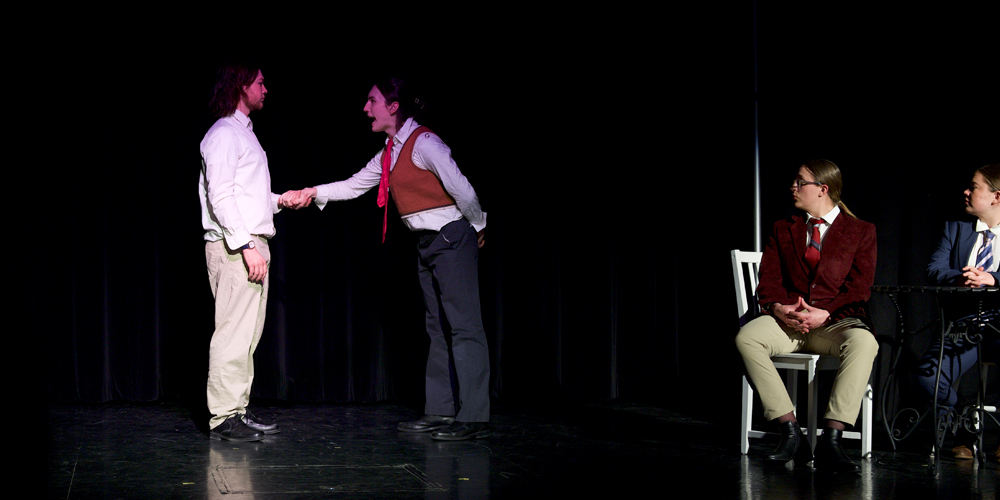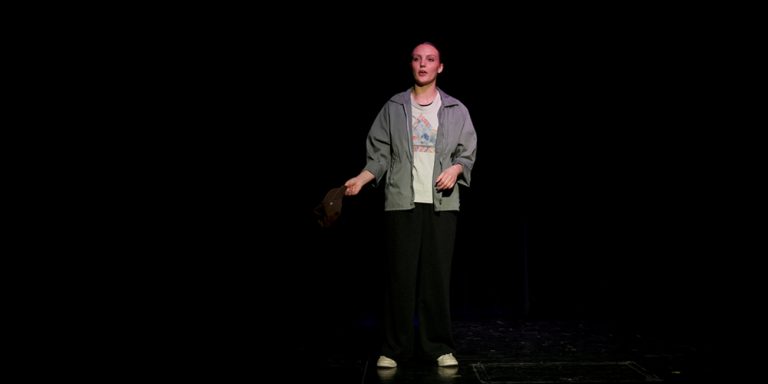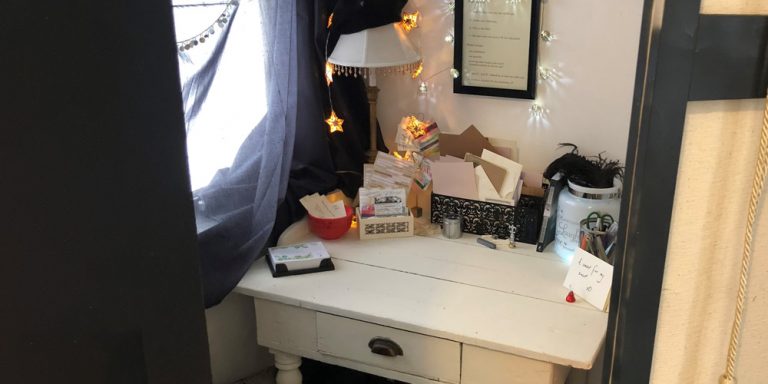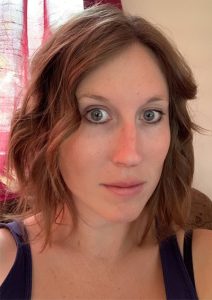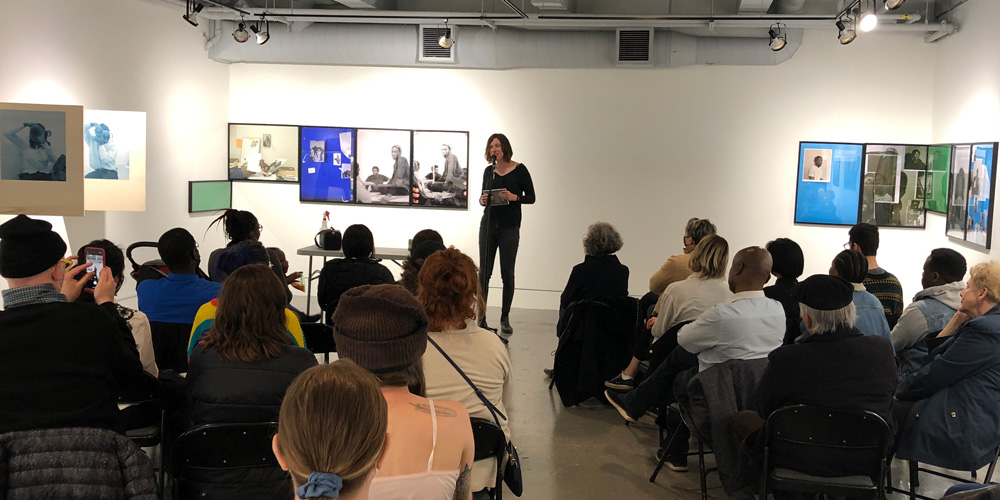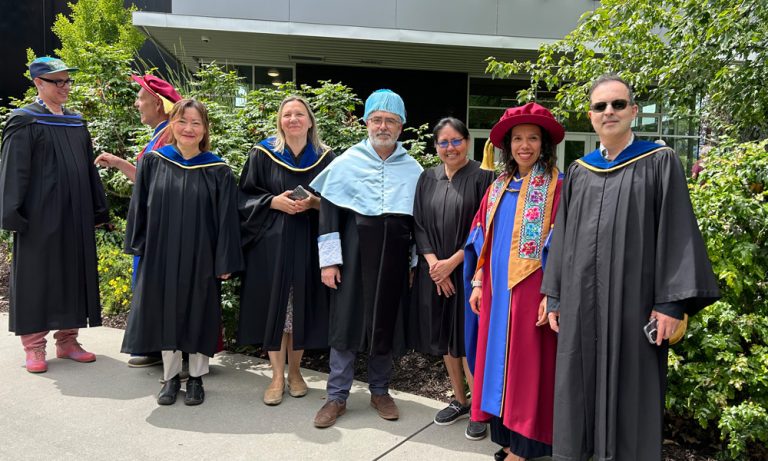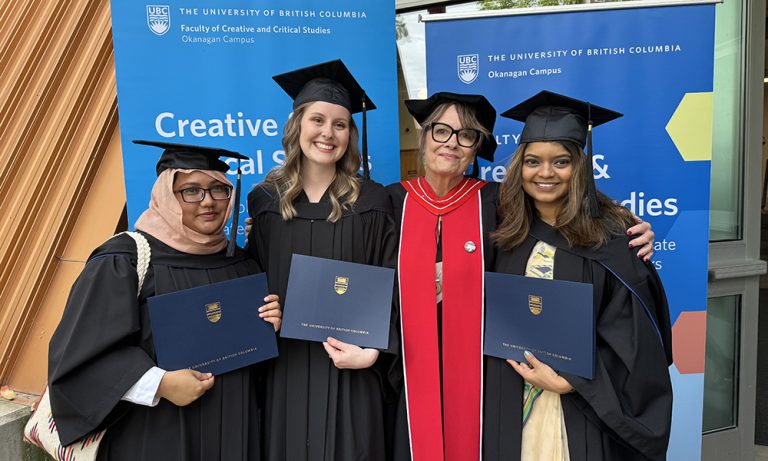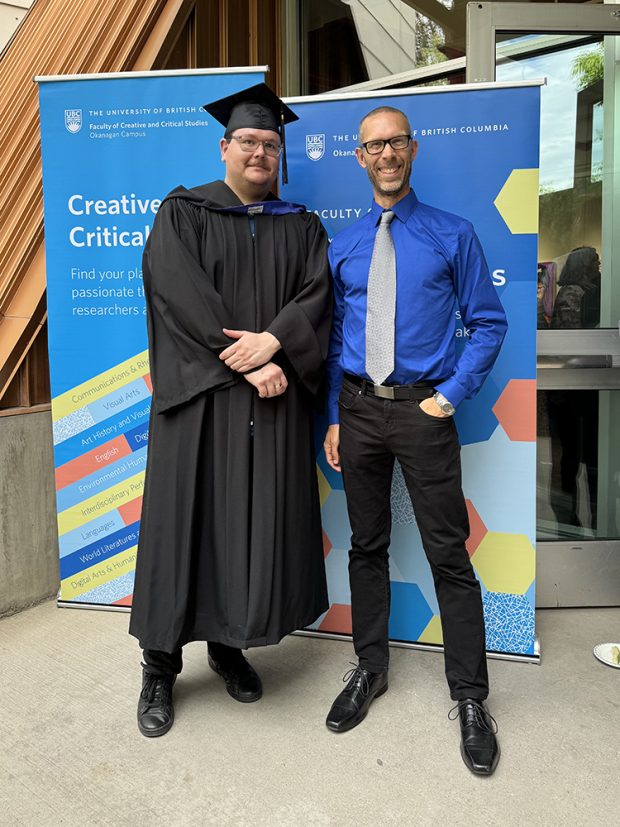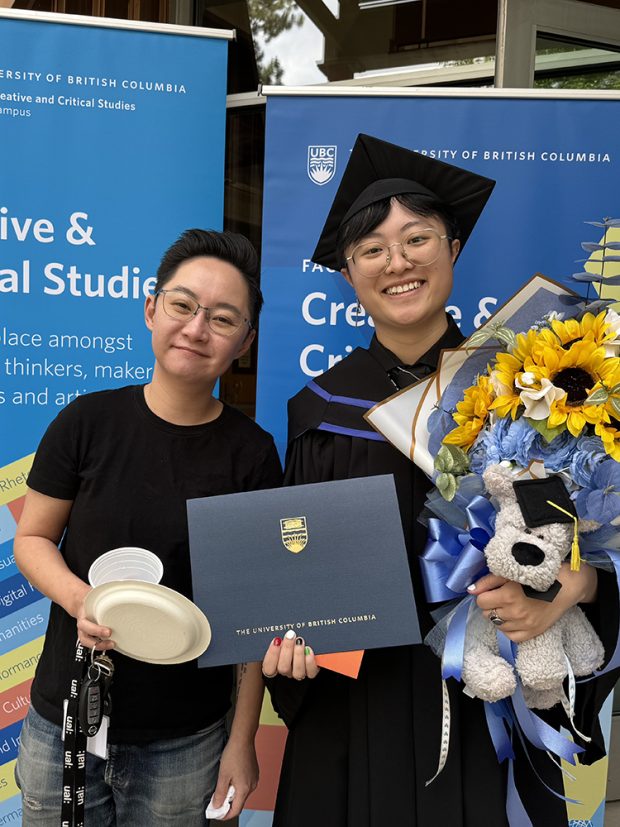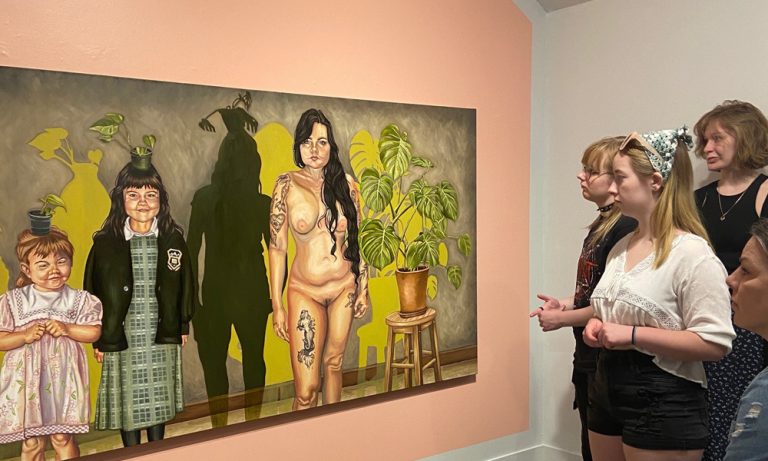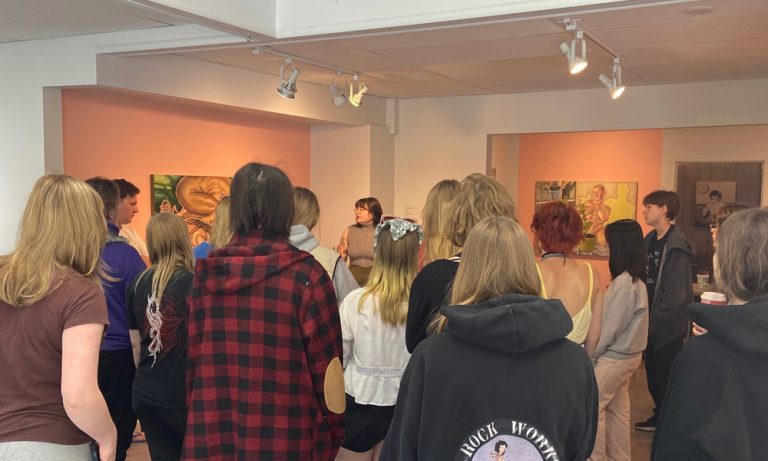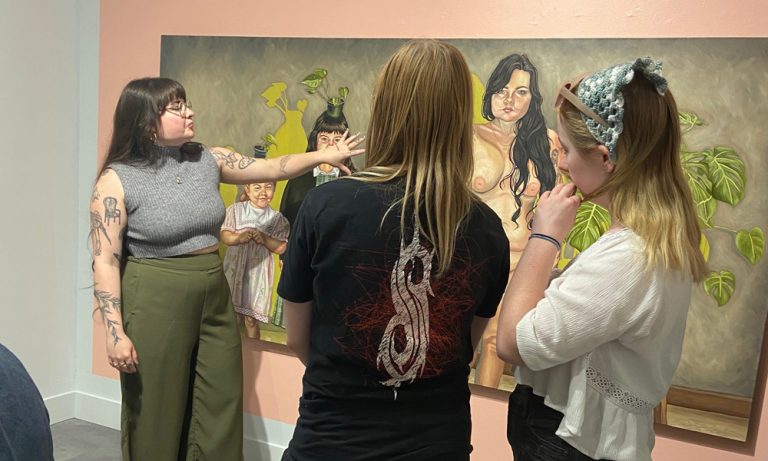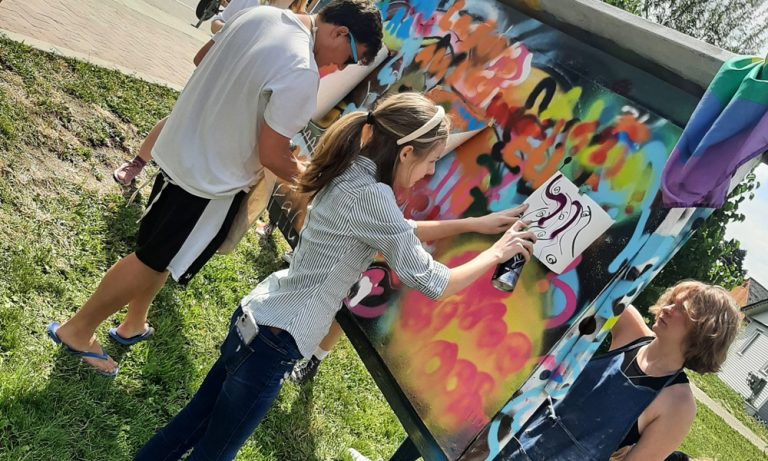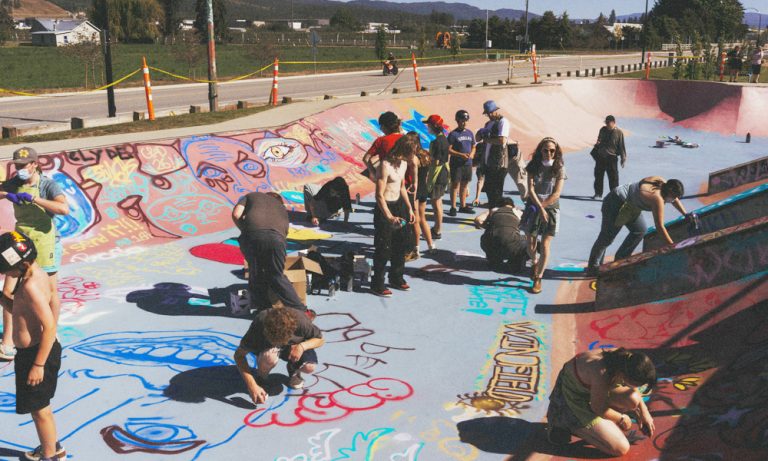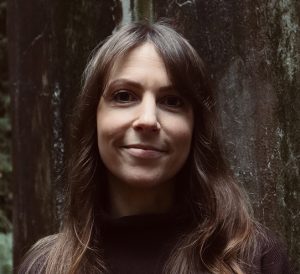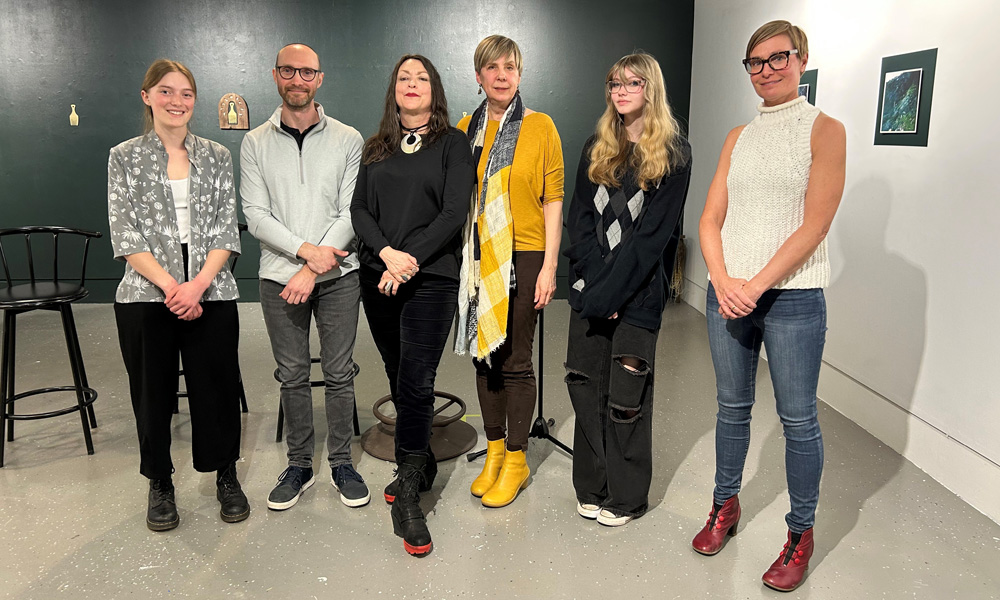Experiential learning engages students in ‘learning by doing’ via direct experience and focused reflection. In ARTH 460, a fourth-year Art History and Visual Culture course on Public Art taught by Nathalie Hager, students were able to increase knowledge, develop skills, clarify values, and better connect theories and knowledge from the classroom to real-world situations. Through a combination of on-site walking tours, class presentations, critical reflection journaling, and a final project that asked students to step into the shoes of the curator for UBC’s public art collection, students had the opportunity to apply what they had learned about the theory behind public artworks and their connection to the community. Each week students spent one day in the classroom, discussing various theoretical readings and North American public art case studies, and listening to guest speakers connect their work with/on various model public art projects across the Okanagan and beyond in a practical, tangible way to highlight public art as social practice. The second day was spent outside and on-site in downtown Kelowna and Rutland, Westbank First Nations, and Penticton, looking at original artworks in-situ and taking turns presenting their research on individual works.
“The course is designed to be both informative and fun, combining key readings that examine the conceptual framework for what public art is, how artists are engaged, and how public art projects are produced in the North American context, with practical experience and knowledge of the public art administration field,” explains instructor Nathalie Hager. “The final project—a 1000-word ‘call for proposals’ for a new work for UBCO’s Outdoor Public Art Collection —allows students to bring together the big ideas of the course in a practical, professional deliverable.”
Images below show students on a few of the cultural art tours for the course in 2022 and 2023.
Early in the course, students tour key public artworks on campus, managed by the UBC Okanagan Gallery, and review UBCO’s policies guiding the acquisition of public artworks. The UBCO walking tour was the class’s first introduction to looking at art, and reinforced the importance of slow-looking and description. The image below shows the students looking at Story Poles, in the courtyard area on campus on a tour offered by UBC Okanagan Gallery summer students in 2023.
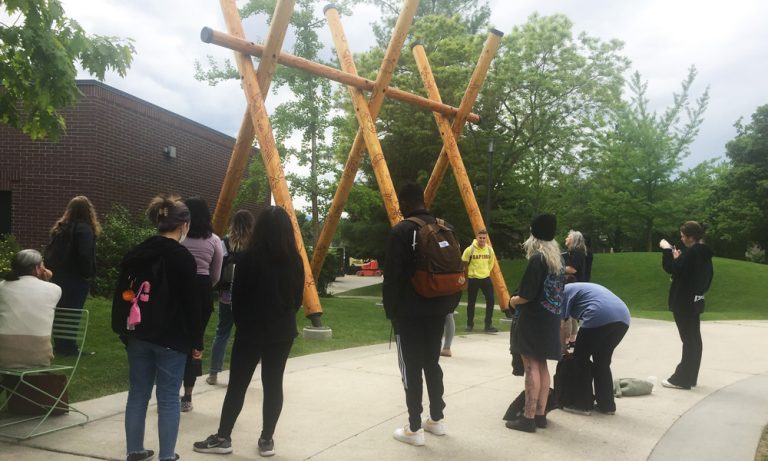
sn̓ilíʔtn, a permanent installation by Syilx artist Les Louis and co-funded by the ONA and UBC, was erected in September of 2016 in the central courtyard on campus to commemorate the 10 year anniversary of UBC Okanagan and the UBC Centennial.
Nancy Holmes met the class at the Kelowna Public Art Pollinator Pasture to highlight the many successes, and also various ‘failures’, of the project including the lasting lessons and legacies of her and Cameron’s work to bring together various community stakeholders, including the City of Kelowna. A key theme was the stark contrast between the Kelowna experience (pasture is now ‘defunct’, abandoned by the City of Kelowna and ‘taken back’ by nature) and the Richmond Pasture (vibrant, ongoing, responsibility and funding assumed by the City of Richmond). Nancy showed the class some of the educational resources that were used to ‘teach’ engaged pasture visitors about the many, many different pollinators and plants key for the project.
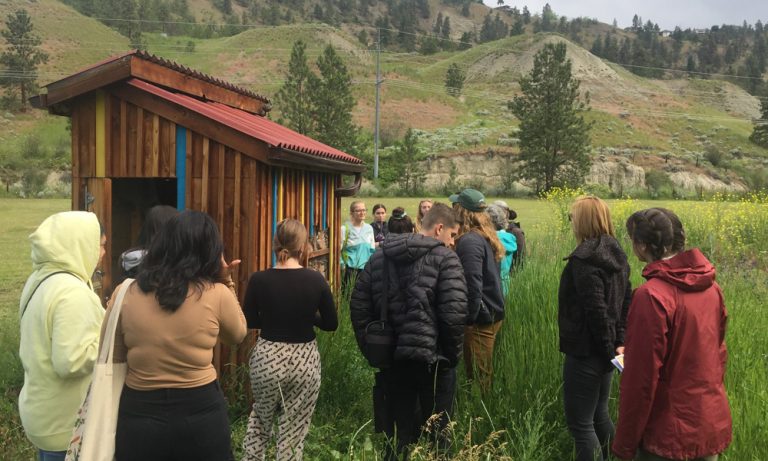
Kelowna Public Art Pollinator Pasture is on City of Kelowna property at the Brent’s Grist Mill Heritage site near the corner of Leckie and Dilworth roads in the heart of Kelowna.
The class connected with students working on the 2022 mural at the Pandosy site, Painted Turtle. David offered the students his thoughts on public muralling in the age of Instagram, the epitome of social practice, and students had the opportunity to observe mural making in progress and ask questions of both David and the students completing the mural.

This mural is located 2820 Pandosy St., and the design features a large western painted turtle, showing it as the sun sets in a very calm surreal setting.
In 2023, students went on walking tours in the Okanagan, and were asked to complete a reflection journal on each walking tour articulating their thoughts on how the City of Kelowna connects with its various publics, and how works connect to community and to one another. Student Isaac O’Connor, is shown below discussing his research on Fruit Stand, and presenting to the class.
“The walking tour of Kelowna’s Cultural District looked at public art depicting the community of Greater Kelowna and the Okanagan Valley. Artwork such as the “Elemental” depict the togetherness of the Syilx people and the settlers that reside here. I personally loved the Fruit Stand, as it reminds me of my childhood.”
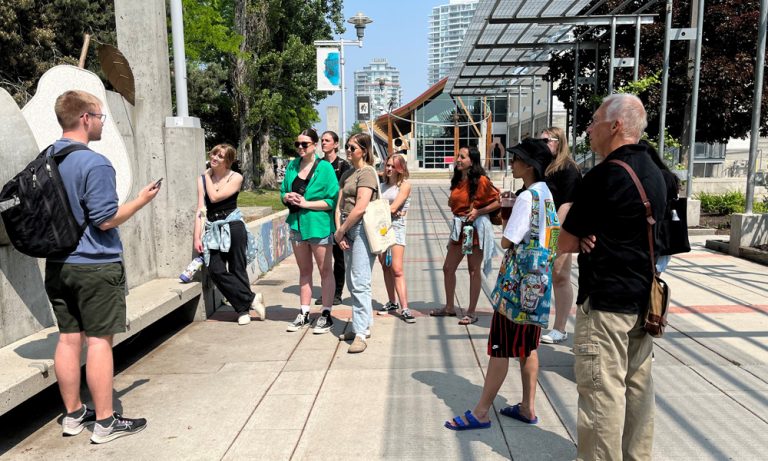
Fruit Box is a whimsical tribute to Kelowna’s agricultural history consists of 7 concrete and terrazzo fruit forms on 5 benches, accompanied by mosaics of vintage fruit box labels, by artists Glen Andersen and T.S. Thomas.
Isabelle Macedo presented her research on Bear. Some of the questions from students centered around the identity of the artists selected for public art commissions, and, in the case of Bear and other waterfront artworks, costs and controversies.
“I worked in Downtown Kelowna for years, and today I realized that I have never taken a moment to look at all of the public art that is Downtown and, even more specifically, the Cultural District. I found it very interesting that all of the art we looked at was not done by any Kelowna artists and, even more so, that only a few artists were even Canadian.”
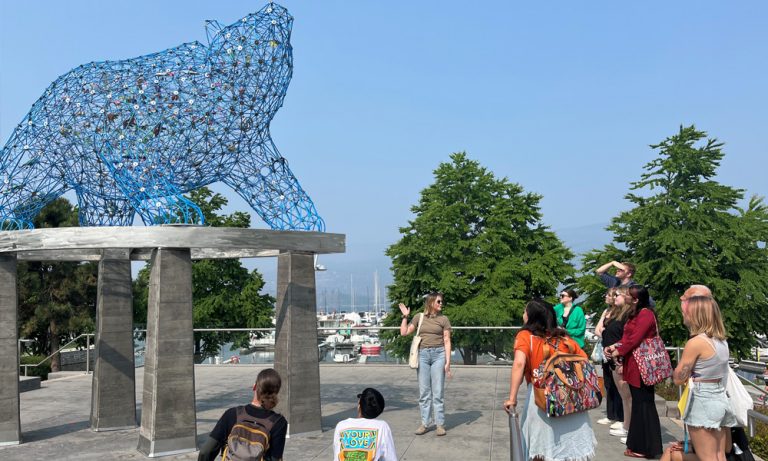
Bear is a tribute to Kelowna’s settlement on the shores of Okanagan Lake. The theme of the artwork is a grizzly bear, “Kelowna” being an English translation of the Okanagan / Syilx First Nation word for “grizzly bear”.
Some students were not at all aware of the existence of Kasugai Gardens, and some had even never been downtown. It was a new concept to ask many students in the class to consider the gardens as art, and to begin to think of the ways in which the space invites the community to think wider than the city itself, towards other cultures and our connections. Here, Muneeba Sheikh presents the gardens.
“The Kasugai Gardens also happen to hold a special place in my heart mostly because of the koi pond. However, a classmate’s silent effort to meditate in that beautiful space was touching to witness, especially since North American Japanese Garden Association refers to it as ‘a pleasant and relaxing environment for quiet reflection’.”
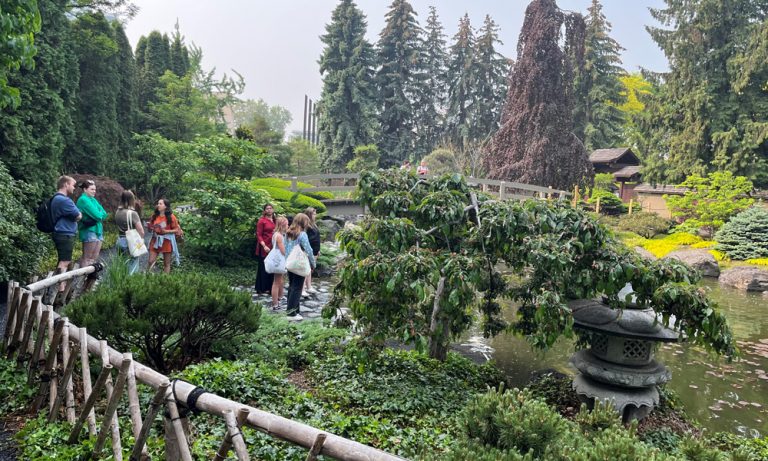
Kasugai Gardens is located within a walled enclosure east of Kelowna City Hall, near the Queensway Transit Exchange.

Students were asked to consider how Natural Language connects to location (outside the Library), and also some of the practical aspects of public art design: it was a warm day, and students learned that on a very hot day the metal sculptures were dangerous to the touch. Kyla Haddad presented her research on this sculpture.
“Within Kelowna’s Cultural District a variety of public art can be found along the waterfront, in between buildings, and on the roads. Although each piece is unique, the artworks all represent themes of identity, culture, and connection. I believe these pieces were well-connected to the central themes of identity, culture and connection while simultaneously showcasing Kelowna’s rich diversity and history. I believe the artists curated these pieces thoughtfully as they were not only functional, but also interactive and informational. I believe successful art allows the viewer to be engaged, educated, and is a source for communication and connection.”
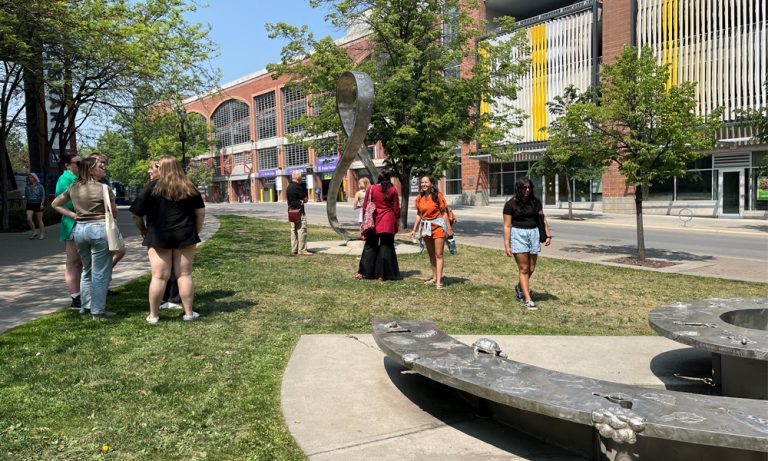
Natural Language consists of 2 works: a functional spiral bench and a rotating 3.7m tall mobius, both made of cast stainless steel. The bench is enhanced with representations of biological diversity and the mobius features letters and symbols derived from the world’s alphabets, by artists Jennifer Macklem and Kip Jones.

After a visit to the Kelowna Art Gallery, the class stepped outside to view this new addition to public art, one commissioned not by the City but by the municipal gallery. Taz Hussein presented Jed Lind’s Gold, Silver & Lead and the work’s commentary on the city’s car culture.
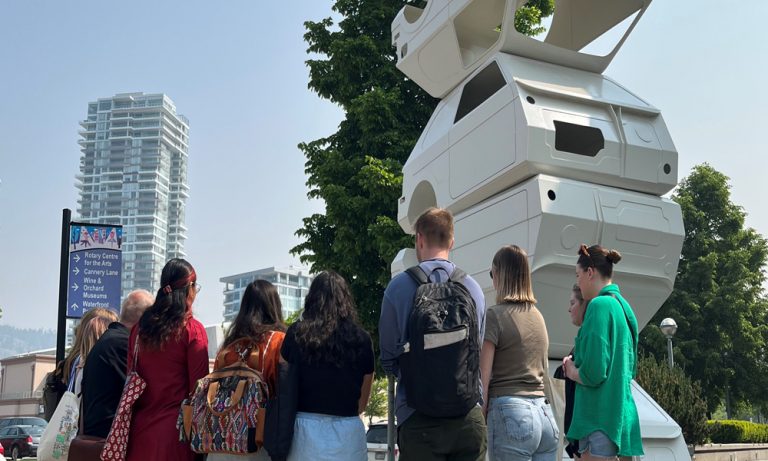
Located outside of the Kelowna Art Gallery, at the corner of Water Street and Cawston Avenue, this installation features seven abstracted car bodies stacked vertically in a minimalist form.
In May 2023, the class visited the Uptown Rutland Murals and received a behind-the-scenes walking tour by Sara Richardson, a student employee of the Uptown Rutland Association (URA), and BFA student taking the Public Art Class, who regularly led tour groups through the various Rutland murals. Sophie Harms reflected on the mural waling tour:
“After encountering various murals of uptown Rutland (funded in the form of a BIA), I found myself enamored by the vibrance and community-driven ethos of this overall project. Rutland is a highly stigmatized neighborhood known for low-income housing and crime; and as one of the oldest neighbourhoods in Kelowna, it can appear rundown. Rutland is also highly diverse, and these murals– especially Ogopogo + Friends by Mono Sourcil, Boost by Taka Sudo, Full Circle by Sandeep Johal, and Colourful Animals Mural by Nick Sweetman highlight this. Ogopogo + Friends presents a tapestry of diverse Rutland-dwellers— each living their own lives in tandem. The piece avoids overly problematic ideas of humanism (ie. “I don’t see colour”) by overtly presenting the limitless possibilities of diversity.”

Students in front of Spirit of the Lake by Nick Sweetman. This work was inspired by the legend of the Ogopogo, a sacred water being which originates from Syilx and Secwepemc story telling.

Students in front of Boost by Taka Sudo. Mashed up urban/city elements and natural/organic elements create the piece.
Students visited the City of Penticton Sculpture Exhibition in June 2023. Asana Hughes reflected on the Penticton Walking Tour:
“On our journey to observe the public artwork of Penticton, we stopped and discussed a total of eight sculptures. Many of the artworks were part of the City of Penticton’s Public Sculpture Exhibit, an annually rotating collection of sculptures on the lakefront and downtown area. Many of the sculptures were linked through the idea of transitions and nature.”
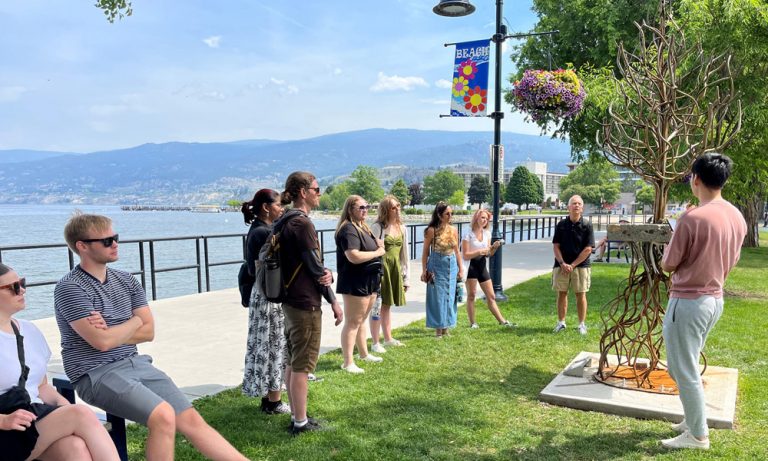
Intersect by Karl Mattson. The Artist has used steel, stone and found objects to demonstrate coexisting, intersecting elements between human and nature.
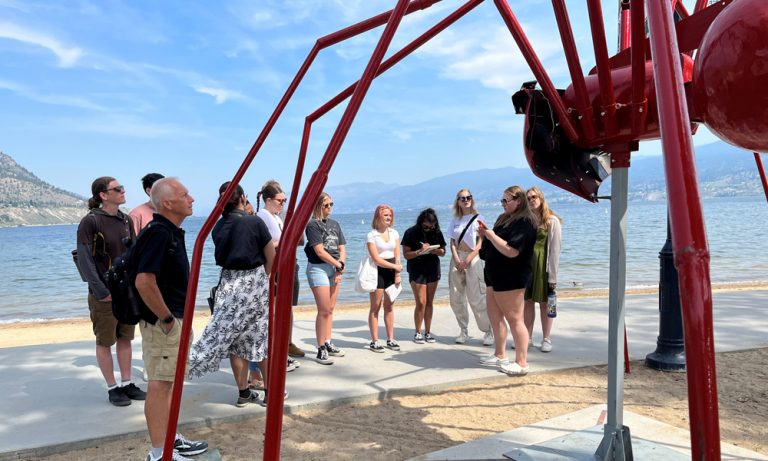
GIGASPIDER by Ron Simmer. This GIGASPIDER is a whimsical and colourful pop art installation that is 100% upcycled from scrap auto parts, a compressor tank, resin ball and used pipe. It incorporates two small solar panels that illuminate the red LED eyes at night.
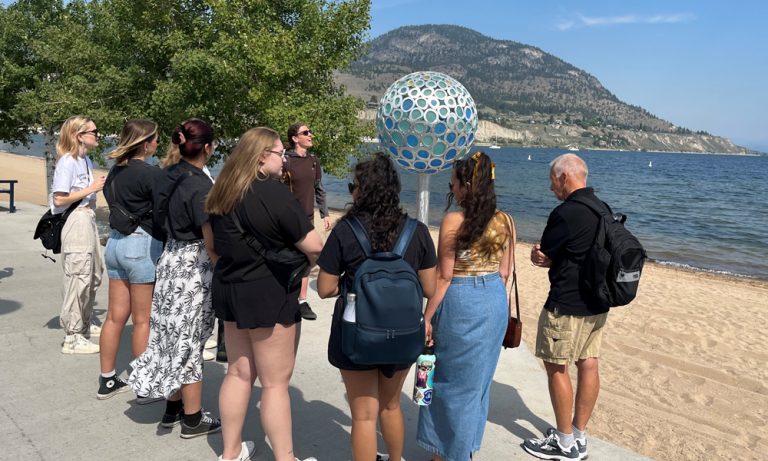
Natural Transitions by William Frymire. The piece is comprised of aluminum rings welded together with colorful acrylic panels that are etched with individual textures and patterns that represent nature on the bottom and a transition to digital as we go up.
It is through the hands-on aspects, the learning by doing—the walking tours and critical reflections, and then researching a drafting an original call for proposals for a unique public artwork that connects with our campus community—that students are able to assimilate new experiences with previous ones, and transform their learning. Take for example one student’s final project proposing a collaborative public artwork and related interpretation and programming focusing on the vast aquifer upon which the UBC Okanagan campus sits—namely, on the unceded and ancestral territory of Syilx Okanagan Nation. Drawing upon their deep respect for Syilx knowledge, rights, and leadership, and engagement with UBC’s Indigenous Strategic Plan, course readings, guest speakers, and the artists and artworks from the various site visits, the student proposed an initiative that would ‘further Syilx values, knowledge systems and language about siwɬkʷ and nixʷtulaʔxʷ tə siwɬkʷ through partnerships and collaboration.’
“This is what experiential learning is all about, taking what you love to learn about and applying it, to actively engage, pose questions, investigate and experiment, be curious, creative, and solve problems. All to construct meaning,” says Hager.
